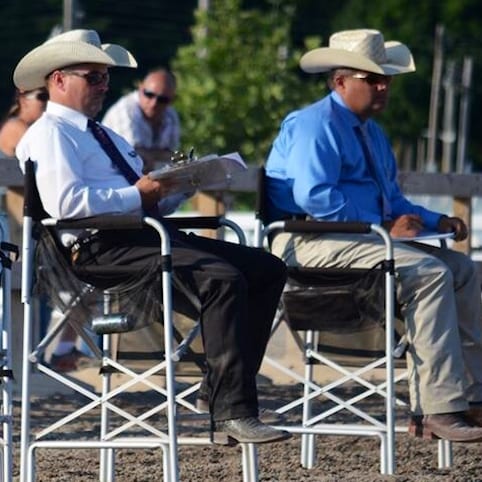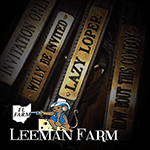When we asked judges what they know now that they wished they knew back when they first started judging, we received some powerful, reflective, and some pretty fun responses, too. Our judges shared everything from insight on how veteran judges manage difficult situations, to what they have learned about the slippery slope of traveling. Read on for some fun and profound commentary whether you are an exhibitor or even a show manager, and also for some great advice if you are thinking of becoming a judge yourself. The best part: you’ll find that the judges evaluating our performance in the ring really do love their chosen profession.
 Bruce Army–The Top 10 things I know now that I wish I’d known then:
Bruce Army–The Top 10 things I know now that I wish I’d known then:
1. Score sheets need to be done in pencil
2. Aleve in the morning
3. Rubber bands are our friends
4. Rule books must be read
5. Sport coats have great pockets
6. Hit the restroom at all breaks
7. Watch where you sit and stand
8. Book early flights coming and going
9. Gate people are saints
10. Sense of humor is a must
 Mark McCarthy–I’ve learned two major things judging all these years: 1. Not to connect through Chicago O’Hare in the summer because it leads to long bus trips. 2. Make sure that you have something on that you can judge in in case your luggage gets lost. Lost luggage really can affect your day of judging.
Mark McCarthy–I’ve learned two major things judging all these years: 1. Not to connect through Chicago O’Hare in the summer because it leads to long bus trips. 2. Make sure that you have something on that you can judge in in case your luggage gets lost. Lost luggage really can affect your day of judging.
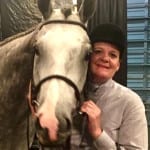 Sonnesa Gooding–A few things that I’ve learned as a judge is that I love it even more than I thought I would. The only downside is the traveling. When things go good, it’s great, but when they don’t, it’s terrible. For instance, a couple of months ago I was leaving to go judge and the plane was delayed four hours, I didn’t get to the hotel until 4:00 AM and had to wake up at 6:00 AM to judge. That makes for a very LONG day.
Sonnesa Gooding–A few things that I’ve learned as a judge is that I love it even more than I thought I would. The only downside is the traveling. When things go good, it’s great, but when they don’t, it’s terrible. For instance, a couple of months ago I was leaving to go judge and the plane was delayed four hours, I didn’t get to the hotel until 4:00 AM and had to wake up at 6:00 AM to judge. That makes for a very LONG day.
 Don Beard–What I know now that I didn’t know then is that quality horses are everywhere you go, and it really gives you an opportunity to see what’s happening in the industry nationwide. It also gives you a gauge on the industry itself, because if you only do things in your own backyard, you don’t know of new ideas and different ways out there. Judging exposes you to a completely different environment all the time, so it’s very educational. I also have learned that nothing about the travel is going to go easy – you can have your flight canceled, or get two hours of sleep before you have to judge a long day. Here’s the other thing I’ve found out that I didn’t know up front – once they’re done with you, you’d better have a plan of exit that actually works. You’re on your own often when a show is done, and I’ve learned to at least ask questions about my departure so I know what’s going to happen, because not all motels actually run a shuttle. That’s all part of the exit plan.
Don Beard–What I know now that I didn’t know then is that quality horses are everywhere you go, and it really gives you an opportunity to see what’s happening in the industry nationwide. It also gives you a gauge on the industry itself, because if you only do things in your own backyard, you don’t know of new ideas and different ways out there. Judging exposes you to a completely different environment all the time, so it’s very educational. I also have learned that nothing about the travel is going to go easy – you can have your flight canceled, or get two hours of sleep before you have to judge a long day. Here’s the other thing I’ve found out that I didn’t know up front – once they’re done with you, you’d better have a plan of exit that actually works. You’re on your own often when a show is done, and I’ve learned to at least ask questions about my departure so I know what’s going to happen, because not all motels actually run a shuttle. That’s all part of the exit plan.
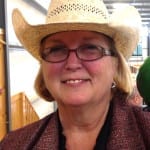 Bonnie Miller–Judging has been a great experience – a continual learning process. Some of the things I have learned over the years that have made my job of sorting through horses and performances easier:
Bonnie Miller–Judging has been a great experience – a continual learning process. Some of the things I have learned over the years that have made my job of sorting through horses and performances easier:
1. When evaluating movement, don’t get distracted by the horse’s topline or the rider’s outfit or tack. Focus underneath the horse – look and evaluate from the ground up and from the back to front.
2. When judging a rail class (western pleasure or hunter under saddle) while standing in the ring, be sure to turn the opposite way that the horses are moving to ensure that you see all the entries in the class. If they are tracking left, I turn to the right to compare movement between horses. If you turn the same way that traffic is moving, it’s possible that you might miss a horse’s entire go.
3. Over the years I have developed strategies to encourage the proper presentation of horses in pattern classes – open the pattern up and ask for an extension at the jog or lope, and make the hunt seat equitation patterns large enough that the horses can canter and trot. I usually ask for a simple change in my patterns – any horse/rider combination should be able to perform a simple change – I want to reward the most effective rider that communicates with their horse – not the rider who happens to have the best trained horse.
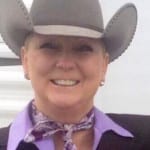 Lori Gordon–I guess that if I knew then what I know now about judging I would have started even sooner. I have been nothing but pleasantly surprised during my judging career. Judging for me has combined my love for horses and showing with my passion for travel and the challenge of academics.
Lori Gordon–I guess that if I knew then what I know now about judging I would have started even sooner. I have been nothing but pleasantly surprised during my judging career. Judging for me has combined my love for horses and showing with my passion for travel and the challenge of academics.
I believe a great judge is a combination of horseman and scholar. I now appreciate breaking and showing those crazy babies we raised growing up, because they taught me to ride and develop feel. I have also always loved school and enjoy the academic aspect of judging and continuing education. I am honored every time I am asked to step in the pen and from showing so much know how much time, effort and money it takes just to get to the horse show – not to get a point or prize or ribbon, but just to get there to compete. So I really try my best to give everyone a fair and honest evaluation and give the exhibitors my all every time I am in the arena.
 Jan Larsen–I wish I had started 10 years sooner than I did. I apprenticed for almost a whole year first, and I have to say my perception of how things were before I started was not a very well-educated observation. I was one of those people as a young horse trainer that thought we should have a group of judges who did nothing but judge. I thought it was a problem that you may be showing to a person that you’re going to judge next week – that there could be favoritism or politics. Now that I am a judge, I know in reality that it’s not a problem at all. I think the people that are judging now are doing the best they can, and I think when we go out there, everybody is just trying to get the best horses on that day on the top of the card.
Jan Larsen–I wish I had started 10 years sooner than I did. I apprenticed for almost a whole year first, and I have to say my perception of how things were before I started was not a very well-educated observation. I was one of those people as a young horse trainer that thought we should have a group of judges who did nothing but judge. I thought it was a problem that you may be showing to a person that you’re going to judge next week – that there could be favoritism or politics. Now that I am a judge, I know in reality that it’s not a problem at all. I think the people that are judging now are doing the best they can, and I think when we go out there, everybody is just trying to get the best horses on that day on the top of the card.
I also know now how important the scoring system is. I’m so impressed with what the AQHA and APHA judges’ committees have developed with the score sheets, descriptions, and maneuvers because they were developed by people that judge and show; it makes our job almost easy because they’re getting so explicit about what we’re supposed to be looking for. It’s nice to be able to look at a score sheet where you can go look a year later – and pretty much be able to describe the go, and we have a reason why we judged it the way we did.
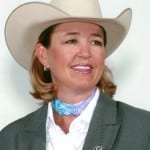 Leanne Williams–There are two kinds of judges, “Those that have and those that will.” This reference is to making mistakes. When I first started judging, if I made a mistake, (numerical, addition, transposition or just plain leaving a number off) I used to beat myself up which could hurt my focus for the next class. I’ve learned to set it aside and deal with it when I have a break. Judges work very hard to do the best job possible. I know now that there are two kind of judges. Those that have made mistakes and those that will sometime in their career.
Leanne Williams–There are two kinds of judges, “Those that have and those that will.” This reference is to making mistakes. When I first started judging, if I made a mistake, (numerical, addition, transposition or just plain leaving a number off) I used to beat myself up which could hurt my focus for the next class. I’ve learned to set it aside and deal with it when I have a break. Judges work very hard to do the best job possible. I know now that there are two kind of judges. Those that have made mistakes and those that will sometime in their career.
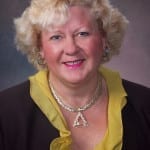 Ann Jones–I’ve learned that everybody makes mistakes. You try not to but, sometimes it just happens. Also, travel can be a bear if the wrong person makes your arrangements. I find that I fare much better if I make my travel arrangements myself. Lastly, read your contract carefully. Understanding what you agree to is always important.
Ann Jones–I’ve learned that everybody makes mistakes. You try not to but, sometimes it just happens. Also, travel can be a bear if the wrong person makes your arrangements. I find that I fare much better if I make my travel arrangements myself. Lastly, read your contract carefully. Understanding what you agree to is always important.
 Daren Wright–As a young judge, find a system that you are comfortable with and stick to it. Trying to change your system or thought process so you can please someone else, or you are afraid to be the “odd man out” in a multiple judging scenario is not fair to you or the exhibitor. Just like an exhibitor, you need to be pleased with your performance at the end of the day as well.
Daren Wright–As a young judge, find a system that you are comfortable with and stick to it. Trying to change your system or thought process so you can please someone else, or you are afraid to be the “odd man out” in a multiple judging scenario is not fair to you or the exhibitor. Just like an exhibitor, you need to be pleased with your performance at the end of the day as well.
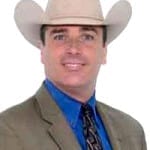 Clint Fullerton–For me, there has never been a negative, truly only positive. Judging has allowed me to have great travel experiences and meet some incredible people, both in and out of the arena. When I was only showing I had an image in my head of what a judge that I only had shown to but never met, was like and getting to judge with them has obviously opened my eyes. Seeing how much these people care about what they do and that they are real people is inspiring. It has been awesome getting to know these people on a personal level and being able to spend time with them. While the educational judging seminars are great, learning from my peers has been one of my greatest rewards.
Clint Fullerton–For me, there has never been a negative, truly only positive. Judging has allowed me to have great travel experiences and meet some incredible people, both in and out of the arena. When I was only showing I had an image in my head of what a judge that I only had shown to but never met, was like and getting to judge with them has obviously opened my eyes. Seeing how much these people care about what they do and that they are real people is inspiring. It has been awesome getting to know these people on a personal level and being able to spend time with them. While the educational judging seminars are great, learning from my peers has been one of my greatest rewards.
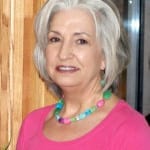 Deb Jarvis–I got my first card, which was my APHA card, in 1978 and horse shows were way different back then compared to now. I started judging 4-H, and then judged some open shows before I got the APHA card, and I know now that was important to do first. What I would say for judges now is they should take advantage of as much as they possibly can through the apprentice program, maybe going one step further and scribing at some of the bigger events, in addition to reining events and cow horse events to garner as much experience as they can with other disciplines that have really come to the forefront now. I would have like to have focused more on doing that, but there was less opportunity back then.
Deb Jarvis–I got my first card, which was my APHA card, in 1978 and horse shows were way different back then compared to now. I started judging 4-H, and then judged some open shows before I got the APHA card, and I know now that was important to do first. What I would say for judges now is they should take advantage of as much as they possibly can through the apprentice program, maybe going one step further and scribing at some of the bigger events, in addition to reining events and cow horse events to garner as much experience as they can with other disciplines that have really come to the forefront now. I would have like to have focused more on doing that, but there was less opportunity back then.
I’ve also learned that having common sense in every situation and using that to the best of your ability, and also knowing to be prepared. I had one situation where my clothes didn’t make it and they gathered up clothes for me, and the clothes I had to wear were pretty humorous. Now I do one thing that everybody has a heart attack over: I carry my hat in a plastic bag on the airplane and just put it under the seat in front of me so I have it when I arrive.
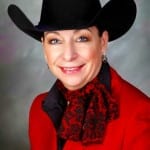 Sally Jo Freund–I wish I knew then, that most of the things I know now is because of what I didn’t know then. A few examples:
Sally Jo Freund–I wish I knew then, that most of the things I know now is because of what I didn’t know then. A few examples:
1. It’s okay and good to be a little nervous before stepping into the arena; it means you care.
2. You really are braver than most, especially the bleacher judges, when you step into the arena to let everyone know your opinions.
3. If anyone thinks any less of you because you ask questions or seek more knowledge, they do not know more than you and are not worth your time.
4. There will always be another horse show. Never pass up the opportunity to share a special event with those that are important in your life.
 Michael Ochetto–For me, I think it is the patience I’ve learned. I’m always very organized and very in control and when I started judging, I thought I would go to the shows and do my job perfectly. Then I found there were a lot of different factors, and there are so many things that can change, that I’ve learned to take a deep breath and roll with show management and the horse shows, and focus on what their needs are. I had to learn to really just go with whatever happened and realized we’re there for the exhibitors, and that everything can be fixed and the show can go on. If you don’t have patience, it can be the fixings for a very long day.
Michael Ochetto–For me, I think it is the patience I’ve learned. I’m always very organized and very in control and when I started judging, I thought I would go to the shows and do my job perfectly. Then I found there were a lot of different factors, and there are so many things that can change, that I’ve learned to take a deep breath and roll with show management and the horse shows, and focus on what their needs are. I had to learn to really just go with whatever happened and realized we’re there for the exhibitors, and that everything can be fixed and the show can go on. If you don’t have patience, it can be the fixings for a very long day.


